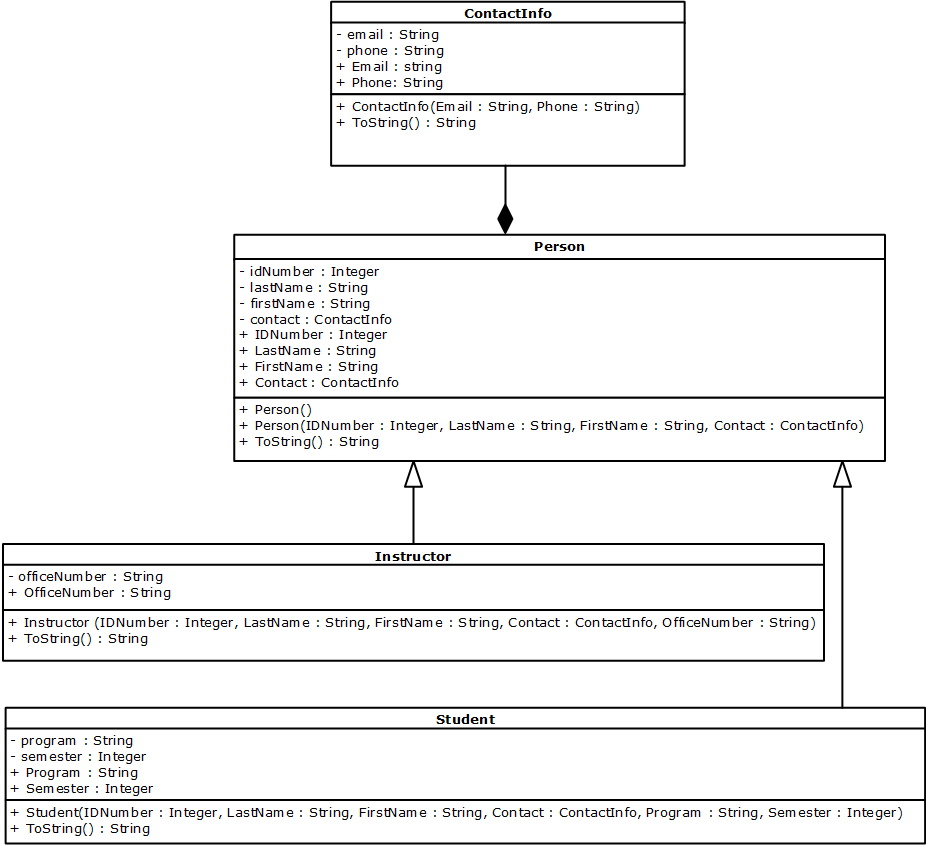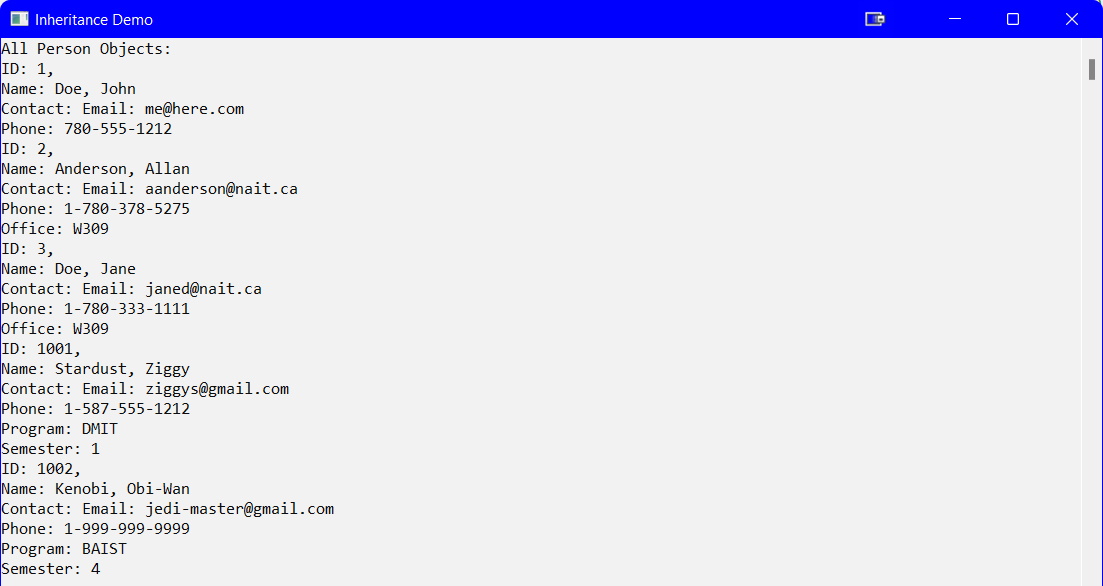Advanced Topics - OOP Inheritance
Introduction
One of the cool aspect of OOP is inheritance. Inheritance is when you create a base, or parent, class and classes that inherit properties and methods from the parent class. In the class diagram below you will see that the Person class has a ContactInfo property which is represented by the solid diamond at the end of the relationship; the Person class cannot exist without the ContactInfo class. Additionally you will see open diamonds at the end of the relationships to the Person class from the Instructor and Student classes. This makes the Person class the parent class.
Examining the properties and constructors of the Instructor and Student classes you will see that their constructors need all the parameters from the Person class in addition to the specific properties of their respective classes:

NOTE: For simplicity there is no validation in the classes below, but it can easily be added. Additionally, the classes are placed in a separate folder, Classes, to demonstrate that you can organize your classes.
ContactInfo Class
namespace InheritanceDemo.Classes
{
public class ContactInfo
{
private string _email;
private string _phone;
public string Email
{
get { return _email; }
set { _email = value; }
}
public string Phone
{
get { return _phone; }
set { _phone = value; }
}
public ContactInfo(string email, string phone)
{
Email = email;
Phone = phone;
}
public override string ToString()
{
return string.Format("Email: {0}\nPhone: {1}",Email,Phone);
}
}//eoc
}//eon
Person Class
namespace InheritanceDemo.Classes
{
public class Person
{
private int _idNumber;
private string _lastname;
private string _firstName;
private ContactInfo _contact;
public int IDNumber
{
get { return _idNumber; }
set { _idNumber = value; }
}
public string LastName
{
get { return _lastname; }
set { _lastname = value; }
}
public string FirstName
{
get { return _firstName; }
set { _firstName = value; }
}
public ContactInfo Contact
{
get { return _contact; }
set { _contact = value; }
}
public Person()
{
IDNumber = 1;
LastName = "Doe";
FirstName = "John";
Contact = new ContactInfo("me@here.com", "1-780-555-1212");
}
public Person(int idNumber, string lastname, string firstName, ContactInfo contact)
{
IDNumber = idNumber;
LastName = lastname;
FirstName = firstName;
Contact = contact;
}
public override string ToString()
{
return string.Format("ID: {0},\nName: {1}, {2}\nContact: {3}", IDNumber, LastName, FirstName, Contact);
}
}//eoc
}//eon
Instructor Class
namespace InheritanceDemo.Classes
{
public class Instructor : Person
{
private string _officeNumber;
public string OfficeNumber
{
get { return _officeNumber; }
set { _officeNumber = value; }
}
public Instructor(int idNumber, string lastName, string firstName, ContactInfo contact, string officeNumber)
{
IDNumber = idNumber;
LastName = lastName;
FirstName = firstName;
Contact = contact;
OfficeNumber = officeNumber;
}
public override string ToString()
{
return string.Format("ID: {0},\nName: {1}, {2}\nContact: {3}\nOffice: {4}", IDNumber, LastName, FirstName, Contact, OfficeNumber);
}
}//eoc
}//eon
Student Class
namespace InheritanceDemo.Classes
{
public class Student : Person
{
private string _program;
private int _semester;
public string Program
{
get { return _program; }
set { _program = value; }
}
public int Semester
{
get { return _semester; }
set { _semester = value; }
}
public Student(int idNumber, string lastName, string firstName, ContactInfo contact, string program, int semester)
{
IDNumber = idNumber;
LastName = lastName;
FirstName = firstName;
Contact = contact;
Program = program;
Semester = semester;
}
public override string ToString()
{
return string.Format("ID: {0},\nName: {1}, {2}\nContact: {3}\nProgram: {4}\nSemester: {5}", IDNumber, LastName, FirstName, Contact, Program, Semester);
}
}//eoc
}//eon
Program Class
As the classes above are in a separate folder, you will need the collowing using code line:
using InheritanceDemo.Classes;
In the Main() method you will need a collection object for all the Person (including Instructor and Student) objects:
List<Person> people = new List<Person>();
LoadPersons()
This method will load data into the List<Person>; it will contain Person, Instructor, and Student objects:
static void LoadPersons(List<Person> people)
{
//1. Add a default person object to the List
people.Add(new Person());
//2. Add some Instructors
people.Add(new Instructor(2, "Anderson", "Allan", new ContactInfo("aanderson@nait.ca", "1-780-378-5275"), "W309"));
people.Add(new Instructor(3, "Doe", "Jane", new ContactInfo("janed@nait.ca", "1-780-333-1111"), "W309"));
//3. Add some Students
people.Add(new Student(1001, "Stardust", "Ziggy", new ContactInfo("ziggys@gmail.com", "1-587-555-1212"), "DMIT", 1));
people.Add(new Student(1002, "Kenobi", "Obi-Wan", new ContactInfo("jedi-master@gmail.com", "1-999-999-9999"), "BAIST", 4));
}//end of LoadPersons
To call this method use:
LoadPersons(people);
DisplayPersons()
This method will display all the Person objects in the list:
static void DisplayPersons(List<Person> people)
{
foreach(Person person in people)
{
Console.WriteLine(person);
}
}//end of DisplayPersons
To call this method add the following:
Console.WriteLine("All Person Objects:");
DisplayPersons(people);
DisplayStudents()
This method will only display the Student objects in the List<Person>:
static void DisplayStudents(List<Person> people)
{
foreach(Person person in people)
{
if (person.GetType() == typeof(Student))
{
Console.WriteLine(person);
}
}
}//end of DisplayStudents
Do not forget to add the following:
Console.WriteLine("\nOnly Student Objects:");
DisplayStudents(people);
DisplayInstructors()
This method is just like the DisplayStudents() method:
static void DisplayInstructors(List<Person> people)
{
foreach(Person person in people)
{
if (person.GetType() == typeof(Instructor))
{
Console.WriteLine(person);
}
}
}//end of Displayinstructors
Do not forget to add the following:
Console.WriteLine("\nOnly Instructor Objects:");
DisplayInstructors(people);
Output


